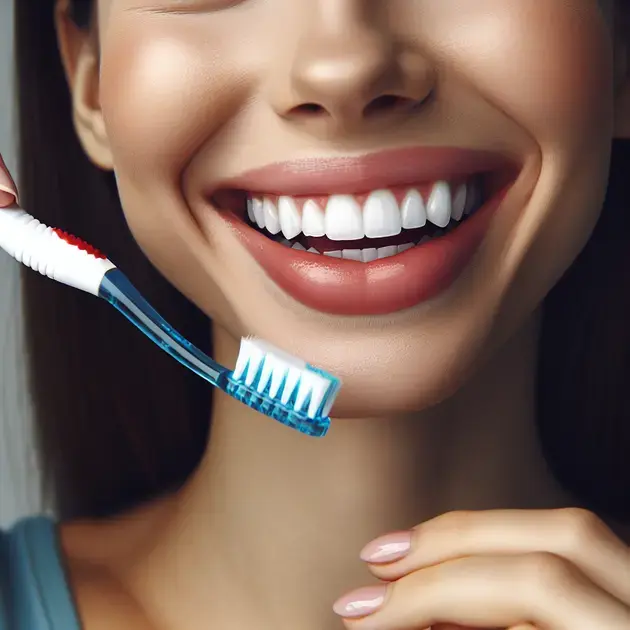When it comes to maintaining good oral hygiene, one essential aspect to focus on is how to prevent bad breath. A fresh breath not only contributes to a better overall oral health but also plays a significant role in boosting your confidence at social interactions and professional environments.
There are various effective ways in which you can prevent bad breath and boost your confidence. From practicing proper oral hygiene habits such as brushing and flossing regularly to staying hydrated and avoiding certain foods that contribute to bad breath, taking these steps can make a significant difference in how you feel and how others perceive you.

Preventing Bad Breath for a Confident Smile
Having bad breath can be a major confidence killer, but with the right oral hygiene practices, you can prevent it and enjoy a fresh, confident smile. One effective way to prevent bad breath is by properly brushing and flossing your teeth. Use a fluoride toothpaste and brush your teeth at least twice a day, making sure to also clean your tongue to remove bacteria buildup. Flossing should be done daily to remove food particles and plaque between teeth.
Another helpful tip to prevent bad breath is to stay hydrated by drinking plenty of water throughout the day. Water helps wash away food particles and bacteria in the mouth that can cause bad breath. Using mouthwash can also be beneficial, as it can kill bacteria and freshen your breath. Look for alcohol-free mouthwash to avoid drying out your mouth.
If you wear dentures or use oral appliances, it’s important to clean them regularly as well. Bacteria can accumulate on these appliances and contribute to bad breath. Soaking them in a denture cleaner or a mixture of vinegar and water can help keep them clean and odor-free.
To further combat bad breath, consider incorporating more fresh fruits and vegetables into your diet. Crisp fruits and vegetables like apples and carrots can help clean your teeth and freshen your breath naturally. Avoiding foods high in sugar and acidity can also help prevent bad breath, as these can contribute to bacteria growth in the mouth.
Lastly, regular visits to the dentist are essential for maintaining good oral hygiene and preventing bad breath. Your dentist can identify any issues early on and provide professional cleanings to keep your mouth healthy and your breath fresh. Follow these tips consistently, and you’ll be on your way to a confident smile with fresh breath.
Effective Tips for Fresh Breath and Boosted Confidence
When it comes to fresh breath and boosted confidence, proper oral hygiene plays a crucial role. One effective tip is to incorporate tongue scraping into your daily routine. Use a tongue scraper to gently remove bacteria and debris from the surface of your tongue, which can help improve your breath freshness.
Chewing sugar-free gum can also be a quick and convenient way to freshen your breath throughout the day. Look for gum that contains xylitol, a natural sweetener that can help prevent bacteria growth in the mouth. Chewing gum stimulates saliva production, which can help wash away food particles and neutralize acids that cause bad breath.
In addition to brushing and flossing, using a tongue cleaner or brush can help ensure that you’re effectively cleaning your entire mouth. Bacteria can hide on the surface of the tongue, leading to bad breath if not properly addressed. Incorporating a tongue cleaner into your routine can help improve your overall oral hygiene.
Mouthwash can be a powerful tool for freshening your breath, but it’s important to use it correctly. Choose a mouthwash that targets bad breath and follow the instructions on the label for best results. Swishing with mouthwash for at least 30 seconds can help kill bacteria and leave your mouth feeling fresh.
For those who struggle with chronic bad breath, it may be helpful to consult with a dentist or healthcare professional. They can assess your oral health and provide personalized recommendations for improving your breath freshness. By following these effective tips consistently, you can boost your confidence and enjoy a fresh, clean mouth.
Achieving Confidence Through Good Oral Hygiene
Good oral hygiene is not only important for maintaining a healthy smile but also for boosting your confidence. One key aspect of good oral hygiene is regular brushing and flossing. Make sure to brush your teeth at least twice a day and floss daily to remove plaque and food particles that can lead to bad breath and dental issues.
Using a fluoride toothpaste is essential for preventing tooth decay and maintaining strong, healthy teeth. Look for toothpaste that has the American Dental Association (ADA) seal of approval for effective cleaning and cavity prevention. Brushing in circular motions for at least two minutes can help ensure thorough cleaning.
In addition to brushing and flossing, don’t forget to clean your tongue as well. Bacteria can accumulate on the surface of the tongue, leading to bad breath and a coated appearance. You can use a toothbrush or a tongue scraper to gently clean your tongue and improve your overall oral hygiene.
Visiting your dentist for regular check-ups and cleanings is another crucial step in achieving confidence through good oral hygiene. Your dentist can spot early signs of dental issues and provide professional cleanings to remove plaque and tartar buildup. They can also offer personalized advice for maintaining a healthy smile.
Along with proper oral care, maintaining a healthy diet and lifestyle can also contribute to improved oral health and confidence. Limit sugary snacks and beverages, which can lead to tooth decay, and opt for nutritious foods that support strong teeth and gums. Drinking plenty of water throughout the day can help wash away bacteria and food particles, keeping your mouth fresh and clean.

Maintaining Oral Health for Improved Self-Esteem
Good oral health is essential for overall well-being. When you prioritize your dental hygiene, you not only maintain a bright smile and fresh breath but also boost your self-esteem. Proper oral care includes brushing your teeth at least twice a day, flossing daily, and visiting your dentist regularly for check-ups and cleanings. By following these simple steps, you can prevent dental issues such as cavities, gum disease, and bad breath. Taking care of your oral health shows that you value yourself and your appearance, leading to improved self-esteem and confidence.
Importance of Regular Dental Check-ups
Scheduling regular dental check-ups is crucial for maintaining good oral health and overall self-esteem. During these visits, your dentist can identify any potential issues early on and provide the necessary treatment. This preventative approach not only saves you from more extensive and expensive dental procedures but also ensures that your smile remains healthy and radiant. By prioritizing regular dental check-ups, you demonstrate a commitment to your well-being and appearance, which can significantly enhance your self-esteem.
The Role of a Balanced Diet
Your diet plays a significant role in your oral health and, consequently, your self-esteem. Consuming a variety of nutritious foods, such as fruits, vegetables, and lean proteins, can help strengthen your teeth and gums. On the other hand, excessive consumption of sugary and acidic foods can lead to tooth decay and other dental issues. By maintaining a balanced diet and limiting harmful substances, you not only protect your oral health but also boost your self-esteem by promoting overall well-being.
The Psychological Impact of a Healthy Smile
A healthy smile can have a profound psychological impact on your self-esteem. When you feel confident about your teeth and overall oral health, you are more likely to engage in social interactions and express yourself freely. Confidence in your smile can also positively influence your professional and personal relationships, as a bright and healthy smile is often perceived as a sign of good hygiene and self-care. By maintaining optimal oral health, you can enhance your self-esteem and project a positive self-image to the world.
Embracing a Daily Oral Care Routine
Developing a daily oral care routine is essential for preserving your oral health and self-esteem. Brushing your teeth, flossing, and using mouthwash are simple yet effective steps that can make a significant difference in your overall well-being. By incorporating these habits into your daily routine, you demonstrate a commitment to self-care and hygiene, which can boost your self-esteem and confidence. Additionally, maintaining a consistent oral care regimen can prevent dental issues and promote a healthy, attractive smile.
Fresh Breath and Confidence: The Winning Combination
Having fresh breath is not only a sign of good oral hygiene but also a confidence booster. When you prioritize maintaining fresh breath, you not only feel more comfortable in social interactions but also exude confidence in professional settings. Good oral hygiene practices, such as regular brushing, flossing, and the use of mouthwash, can help combat bad breath and ensure that your smile remains fresh and inviting. By incorporating these habits into your daily routine, you can enhance your self-assurance and make a positive impression on others.
The Impact of Bad Breath on Self-Esteem
Bad breath, also known as halitosis, can have a detrimental effect on your self-esteem and confidence. Persistent bad breath can cause feelings of embarrassment and self-consciousness, leading to avoidance of social interactions and diminished self-assurance. Addressing the root cause of bad breath through proper oral hygiene and regular dental check-ups is crucial for restoring your self-esteem and confidence. By taking steps to maintain fresh breath, you not only improve your oral health but also elevate your self-image and overall well-being.
Benefits of Fresh Breath for Self-Confidence
Having fresh breath can significantly boost your self-confidence and empower you in various aspects of your life. When you feel confident about the freshness of your breath, you are more likely to engage in conversations, meetings, and other social interactions without hesitation. Fresh breath enhances your overall presence and leaves a positive impression on those around you. By prioritizing good oral hygiene practices that promote fresh breath, you can increase your self-assurance and project a sense of confidence that resonates with others.
Maintaining Fresh Breath with Good Dental Habits
Adopting good dental habits is key to maintaining fresh breath and boosting your self-confidence. In addition to brushing and flossing, staying hydrated and avoiding foods that contribute to bad breath can help keep your mouth feeling clean and your breath fresh. Using a tongue scraper and visiting your dentist regularly for cleanings and check-ups are also important steps in ensuring long-lasting fresh breath. By incorporating these habits into your daily routine, you can enjoy the benefits of fresh breath and the confidence that comes with it.
Boost Your Self-Assurance with Good Dental Habits
Good dental habits are not only essential for maintaining oral health but also for boosting self-assurance. By prioritizing your dental care and hygiene, you can enhance your overall well-being and project a positive self-image to the world. Consistent dental routines, such as brushing, flossing, and visiting your dentist, can prevent dental issues and ensure that your smile remains healthy and radiant. These habits not only benefit your oral health but also contribute to improved self-esteem and confidence in all aspects of your life.
The Link Between Dental Health and Self-Confidence
There is a direct correlation between dental health and self-confidence. When you take care of your teeth and gums, you not only maintain a beautiful smile but also feel more self-assured in social and professional situations. Knowing that you have a healthy and attractive smile can boost your confidence and make you feel more comfortable expressing yourself. Good dental habits, such as regular cleanings and check-ups, play a significant role in preserving your oral health and enhancing your self-assurance.
The Role of Preventative Care
Preventative dental care is crucial for maintaining good oral health and confidence. By staying proactive with your dental hygiene and scheduling regular check-ups, you can prevent dental issues before they escalate. This proactive approach not only saves you time and money on potential treatments but also ensures that you maintain a bright and confident smile. Prioritizing preventative care demonstrates a commitment to self-care and well-being, ultimately boosting your self-assurance and overall confidence.
Enhancing Self-Assurance Through Routine Dental Visits
Regular dental visits are an essential component of maintaining good oral health and enhancing self-assurance. During these visits, your dentist can assess your oral health, address any concerns, and provide personalized recommendations for optimal care. By following through with routine dental visits, you show that you value your oral health and appearance, leading to improved self-esteem and confidence. Investing in your dental care not only benefits your smile but also empowers you to face the world with greater self-assurance and positivity.
The Psychological Benefits of Good Dental Habits
Adopting good dental habits offers numerous psychological benefits that contribute to enhanced self-assurance. When you prioritize your oral health through consistent brushing, flossing, and dental visits, you signal to yourself and others that you care about your well-being. This commitment to self-care fosters a sense of confidence and self-assurance that can positively impact various aspects of your life. By maintaining good dental habits, you not only maintain a healthy smile but also cultivate a strong sense of self-esteem that radiates outward in your interactions and relationships.
Conclusion
Good oral health is not just about having a bright smile and fresh breath; it’s also a key factor in boosting self-esteem. By prioritizing simple oral care practices like regular brushing, flossing, and dental check-ups, you can prevent dental issues and show that you value yourself. This commitment to oral health translates to improved self-esteem and confidence, impacting both your personal and professional life.
Embracing a Daily Oral Care Routine
Developing a daily oral care routine is crucial for maintaining oral health and self-esteem. Incorporating habits like brushing, flossing, and mouthwash into your daily life not only demonstrates a commitment to self-care but also helps prevent dental issues and promote a healthy smile. By maintaining consistency in your oral care, you can boost your self-esteem and confidence levels effectively.
Enhancing Self-Assurance Through Preventative Care
Preventative dental care plays a significant role in maintaining good oral health and confidence. By being proactive with your dental hygiene, such as regular cleanings and check-ups, you can prevent potential dental problems before they worsen. This proactive approach not only saves you time and money but also contributes to a bright and confident smile, ultimately improving your self-assurance and overall confidence.

















